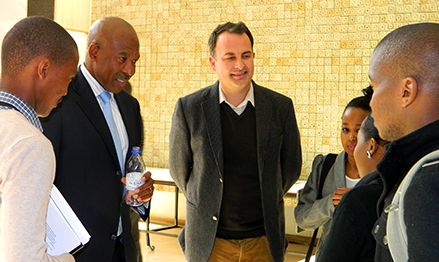Latest News Archive
Please select Category, Year, and then Month to display items
04 April 2024
|
Story Lunga Luthuli
|
Photo SUPPLIED
 Dr Juliet Kamwendo champions gender-inclusive climate action in Africa. Her expertise at the recently held AFR100 workshop highlighted vital steps towards sustainable and equitable development.
Dr Juliet Kamwendo champions gender-inclusive climate action in Africa. Her expertise at the recently held AFR100 workshop highlighted vital steps towards sustainable and equitable development.
Dr Juliet Kamwendo, Lecturer and Programme Director for Gender Studies in the Centre for Gender and Africa Studies at the University of the Free State, is spearheading efforts to integrate gender considerations into Africa's climate restoration agenda. Reflecting on her involvement, Dr Kamwendo stated, "This is particularly crucial, as women make up almost 50% of the population in Africa, and the depletion and degradation of land affect them disproportionately."
She recently served as a gender expert at the AUDA-NEPAD AFR100 workshop in Ouagadougou, Burkina Faso, from 25 to 29 March 2024. This initiative aims to restore forests and degraded land across Africa by 2030, with a focus on gender equality.
The workshop emphasised the integration of gender perspectives into the AFR100 project, acknowledging the disproportionate impact of land degradation on women. Dr Kamwendo's expertise highlighted the need to empower women in climate change interventions, addressing existing gender inequalities exacerbated by environmental degradation.
“Women – who are primarily responsible for household food security and water provision – bear the brunt of environmental degradation, leading to increased workloads, reduced income opportunities, and heightened vulnerability to climate-related disasters. Furthermore, the loss of forest cover and biodiversity further exacerbates the challenges faced by women, particularly in rural areas where they depend heavily on natural resources for their livelihoods,” added Dr Kamwendo.
Her participation highlights academia's crucial role in fostering inclusive and sustainable development, emphasising interdisciplinary collaboration to tackle complex environmental challenges. Through initiatives such as AFR100, stakeholders are working towards a more resilient and gender-responsive future for Africa.
UFS101 students learn from the masters
2013-09-01
 |
Letsetja Kganyago (second from the left) and Dr Francois Strydom (on the right, next to him, Director of the Centre for Teaching and Learning, in discussion with third-year students.
Photo: Stefan Lotter
01 September 2013 |
Huge effort is employed to expose first-year students through the UFS101 programme to the largest possible landscapes of South African politicals, economics and other fields. The lecture that Letsetja Kganyago, Deputy Governor of the South African Reserve Bank, delivered in August 2013, was no exception.
About 4 000 students attended the lecture at the Bloemfontein Campus, of which 150 students on the Qwaqwa Campus shared in the proceedings via live streaming. Kganyago discussed the impact of the international financial crisis on South Africa, as well as on the man in the street.
Third-year and postgraduate students also had an opportunity to talk to him during his visit.
The UFS101 programme was bolstered earlier this year through lectures delivered by a judge from the Free State Supreme Court, as well as Prof Jonathan Jansen, Vice-Chancellor and Rector.